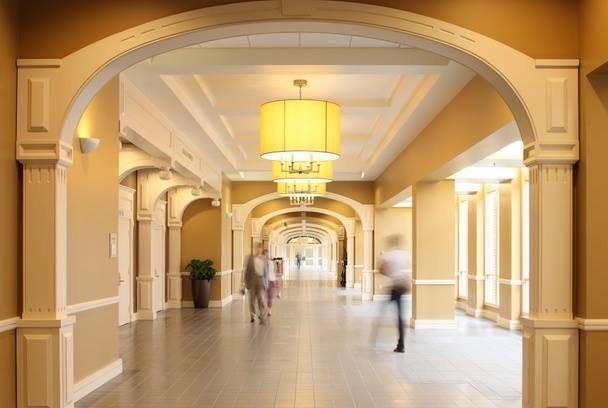After multiple fire drill evacuations in the Georgetown University Hotel and Conference Center, students have drafted a petition calling for more information on why alarms sounded.
On Sept. 21, students reported a fire alarm went off around 9:30 p.m., only to be shut off 30 minutes later. Nearly seven hours later, students reported that the fire alarms went off again for nearly 30 minutes, starting at 4:10 a.m. Neither incident stemmed from an actual fire, but was instead caused by a damaged fire alarm in the Leavey Center, according to a letter to hotel residents from Joel Weiss, general manager of the Georgetown University Hotel and Conference Center.

After the incident, Akil Cole (COL ’24), a resident of the hotel, wrote a petition addressed to the Office of Residential Living, the Georgetown University Hotel and Conference Center and the Georgetown University Police Department about repeated unannounced fire drills and a perceived lack of communication from the university. As of Sept. 30, the petition had been signed by 25 students.
“The frequency and seeming randomness of these fire alarm events decreases the likelihood of taking a real fire alarm seriously,” the petition reads. “Fire alarms should not be mundane, routine, or normalized. If these events continue to occur as frequently as they do, students, staff, and GUPD alike risk collective desensitization, reducing our community’s capacity to respond appropriately to fire in the future.”
While the disruptions may be frustrating to students, the Georgetown University Hotel and Conference Center urges students to follow necessary fire safety precautions, according to Weiss’ letter to residents.
“I apologize for the inconvenience and can understand the aggravation of a false alarm during a school night,” the letter reads. “I would strongly recommend however that for any reason the Fire Alarm goes off again during your stay here that you adhere to the Fire Safety Information you were provided when you arrived and go to your designated area on the Esplanade.”
The hotel houses approximately 80 undergraduate students in permanent dorm capacity. However, students quarantining after testing positive for COVID-19 are also placed in the hotel.
To Naomi Eluojierior (NHS ’23), a hotel resident who signed the petition, evacuating into the same space as students who had tested positive for COVID-19 presents a significant risk of infection.
“It makes me feel unsafe and unprotected because the last time I had to evacuate the residence, I forgot to put on my mask. It is very possible that I would have caught something assuming a COVID patient sneezed during the evacuation,” Eluojierior wrote in an email to The Hoya.
The petition calls on the Office of Residential Living to release a report on past and future fire alarm drills and the hotel to establish new protocols for communication with students. The petition additionally calls on GUPD to investigate the cause of all fire alarms.
While the university understands the students’ frustrations, proper fire response protocols are crucial to ensure campus safety, according to a university spokesperson.
“While we have not received a petition, we understand that repeated alarms may cause wariness,” a university spokesperson wrote in an email to The Hoya. “We remind all campus residents that fire response is a critical safety issue where every second counts. Information on evacuation procedures is made available to students and we encourage them to review the instructions for their residence.”
Cole says the university still must do more to respond to student concerns and meet the needs of students.
“While I recognize the complexity of our return to campus, I don’t accept Georgetown’s lack of substantive response to these incidents,” Cole wrote.




















